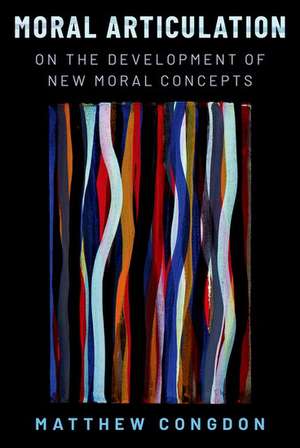Moral Articulation: On the Development of New Moral Concepts
Autor Matthew Congdonen Limba Engleză Hardback – 17 ian 2024
Preț: 490.34 lei
Preț vechi: 605.36 lei
-19% Nou
Puncte Express: 736
Preț estimativ în valută:
93.83€ • 98.21$ • 78.09£
93.83€ • 98.21$ • 78.09£
Carte disponibilă
Livrare economică 10-24 martie
Preluare comenzi: 021 569.72.76
Specificații
ISBN-13: 9780197691571
ISBN-10: 0197691579
Pagini: 258
Dimensiuni: 203 x 147 x 36 mm
Greutate: 0.43 kg
Editura: Oxford University Press
Colecția OUP USA
Locul publicării:New York, United States
ISBN-10: 0197691579
Pagini: 258
Dimensiuni: 203 x 147 x 36 mm
Greutate: 0.43 kg
Editura: Oxford University Press
Colecția OUP USA
Locul publicării:New York, United States
Recenzii
By introducing the concept of articulation into the debate on moral epistemology, Matthew Congdon's Moral Articulation manages to solve one of the pressing issues at stake: Where do new moral ideas come from? Overcoming the unsatisfactory alternatives between "inventing," "constructing," and "discovering" them, it is the ongoing and strenuous process of "articulation" that should give us a clue here. A pathbreaking contribution. Elegantly written and masterfully done, Moral Articulation is a wonderful read and a well needed proof that it takes the encompassing architecture of a monograph to make a real difference in philosophy.
In this deftly crafted book, Matthew Congdon aims to combine a historicized conception of moral intelligibility with realism about moral value. The circle is squared in the idea of "moral articulation"-the act of being true to a phenomenon while also thereby shaping it. The result is a compelling new articulation of the possibilities of historically sensitive yet realist thinking in ethics.
How do moral concepts, such as racism, take on an authority over our thinking that they did not have before? In this fascinating study, Matthew Congdon strikes an illuminating balance of a kind of realism about the object of the concept with an account of how that concept nonetheless has a historical context in which it is grasped. This rich and sophisticated treatment takes our understanding to a new level, which will doubtless have a significant influence on how to characterise our moral thinking and its development over time.
This book was a fascinating read.
The book is engaging, well researched, and clearly written.
Taking as its particular object the birth and development of new moral concepts [Congdon] seeks to display how moral thought is reality-oriented, reflective and rational, while being at the same time subject to historical change. The book's strength lies in Congdon's careful combination of ideas in the moral philosophical literature of recent decades, his patience with opposing news, and a clear presentation of his position ... Congdon provides us with what I think is the most thorough theoretical exploration of this register of moral thought to date.
How we come to engender new ethical and political concepts in the face of initially nameless but nonetheless meaningful experiences is the driving concern of Matthew Congdon's remarkable book, Moral Articulation: On the Development of New Moral Concepts. In this text, Congdon offers a highly original account of how initially inchoate experiences can lead us to produce new ethical concepts, contending that the articulation of these concepts contributes to the constitution of the very ethical reality they seek to capture.
In this deftly crafted book, Matthew Congdon aims to combine a historicized conception of moral intelligibility with realism about moral value. The circle is squared in the idea of "moral articulation"-the act of being true to a phenomenon while also thereby shaping it. The result is a compelling new articulation of the possibilities of historically sensitive yet realist thinking in ethics.
How do moral concepts, such as racism, take on an authority over our thinking that they did not have before? In this fascinating study, Matthew Congdon strikes an illuminating balance of a kind of realism about the object of the concept with an account of how that concept nonetheless has a historical context in which it is grasped. This rich and sophisticated treatment takes our understanding to a new level, which will doubtless have a significant influence on how to characterise our moral thinking and its development over time.
This book was a fascinating read.
The book is engaging, well researched, and clearly written.
Taking as its particular object the birth and development of new moral concepts [Congdon] seeks to display how moral thought is reality-oriented, reflective and rational, while being at the same time subject to historical change. The book's strength lies in Congdon's careful combination of ideas in the moral philosophical literature of recent decades, his patience with opposing news, and a clear presentation of his position ... Congdon provides us with what I think is the most thorough theoretical exploration of this register of moral thought to date.
How we come to engender new ethical and political concepts in the face of initially nameless but nonetheless meaningful experiences is the driving concern of Matthew Congdon's remarkable book, Moral Articulation: On the Development of New Moral Concepts. In this text, Congdon offers a highly original account of how initially inchoate experiences can lead us to produce new ethical concepts, contending that the articulation of these concepts contributes to the constitution of the very ethical reality they seek to capture.
Notă biografică
Matthew Congdon is Assistant Professor of Philosophy at Vanderbilt University. His work has appeared in The Philosophical Quarterly, Analysis, The European Journal of Philosophy, Episteme, and Philosophical Topics, among another publications.
